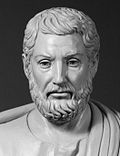Athenian democracy
Athenian Democracy[edit]
Athenian democracy was a system of governance developed in the city-state of Athens during the 5th century BCE. It is one of the earliest known forms of democracy and has been influential in the development of modern democratic systems. This article explores the structure, function, and historical significance of Athenian democracy.
Historical Context[edit]
Athenian democracy emerged in the context of the Classical Greek period, a time marked by significant political, cultural, and intellectual developments. The reforms of Solon in the early 6th century BCE laid the groundwork for democratic governance, but it was the later reforms of Cleisthenes around 508/507 BCE that established the foundations of Athenian democracy.
Structure of Athenian Democracy[edit]
Athenian democracy was characterized by three main institutions:
The Assembly (Ekklesia)[edit]
The Assembly was the principal body of Athenian democracy, where citizens could participate directly in decision-making. It was open to all male citizens over the age of 18. The Assembly met regularly on the Pnyx, a hill in Athens, to discuss and vote on various issues, including laws, war, and foreign policy.
The Council of 500 (Boule)[edit]
The Council of 500, or Boule, was responsible for setting the agenda for the Assembly and overseeing the execution of its decisions. Members of the Boule were chosen by lot and served for one year. The Council was divided into ten groups, each representing one of the ten tribes of Athens.
The Courts (Dikasteria)[edit]
The Athenian legal system was another crucial component of its democracy. The courts were composed of large juries, often numbering in the hundreds, drawn from the citizenry. Jurors were selected by lot, and their decisions were final. The courts handled a wide range of cases, from criminal trials to disputes between citizens.
Participation and Citizenship[edit]
Participation in Athenian democracy was limited to male citizens, excluding women, slaves, and foreigners (metics). Citizenship was typically inherited, and only those born to Athenian parents could participate fully in the democratic process.
Significance and Legacy[edit]
Athenian democracy is significant for its early implementation of democratic principles, such as direct participation and equality before the law. It influenced later democratic systems, including the Roman Republic and modern representative democracies. However, it also had limitations, such as the exclusion of large segments of the population from political participation.
Criticisms and Challenges[edit]
Athenian democracy faced several criticisms and challenges during its existence. Critics like Plato and Aristotle questioned the wisdom of allowing the masses to make important decisions, arguing that it could lead to mob rule. Additionally, the system was vulnerable to demagogues who could sway public opinion for personal gain.
Conclusion[edit]
Athenian democracy was a pioneering system that laid the groundwork for future democratic developments. Despite its limitations and challenges, it remains a crucial reference point in the study of political systems and the history of democracy.
References[edit]
- Aristotle, The Athenian Constitution
- Thucydides, History of the Peloponnesian War
- Plato, The Republic
-
Funeral Oration of Pericles
-
Demos being crowned by Democracy, Ancient Agora Museum in Athens
-
Cleisthenes
-
Constitution of the Athenians in the 4th century BC
-
Constitution of Athens
-
Pnyx
-
Pericles
Ad. Transform your life with W8MD's Budget GLP-1 injections from $49.99


W8MD offers a medical weight loss program to lose weight in Philadelphia. Our physician-supervised medical weight loss provides:
- Weight loss injections in NYC (generic and brand names):
- Zepbound / Mounjaro, Wegovy / Ozempic, Saxenda
- Most insurances accepted or discounted self-pay rates. We will obtain insurance prior authorizations if needed.
- Generic GLP1 weight loss injections from $49.99 for the starting dose of Semaglutide and $65.00 for Tirzepatide.
- Also offer prescription weight loss medications including Phentermine, Qsymia, Diethylpropion, Contrave etc.
NYC weight loss doctor appointmentsNYC weight loss doctor appointments
Start your NYC weight loss journey today at our NYC medical weight loss and Philadelphia medical weight loss clinics.
- Call 718-946-5500 to lose weight in NYC or for medical weight loss in Philadelphia 215-676-2334.
- Tags:NYC medical weight loss, Philadelphia lose weight Zepbound NYC, Budget GLP1 weight loss injections, Wegovy Philadelphia, Wegovy NYC, Philadelphia medical weight loss, Brookly weight loss and Wegovy NYC
|
WikiMD's Wellness Encyclopedia |
| Let Food Be Thy Medicine Medicine Thy Food - Hippocrates |
Medical Disclaimer: WikiMD is not a substitute for professional medical advice. The information on WikiMD is provided as an information resource only, may be incorrect, outdated or misleading, and is not to be used or relied on for any diagnostic or treatment purposes. Please consult your health care provider before making any healthcare decisions or for guidance about a specific medical condition. WikiMD expressly disclaims responsibility, and shall have no liability, for any damages, loss, injury, or liability whatsoever suffered as a result of your reliance on the information contained in this site. By visiting this site you agree to the foregoing terms and conditions, which may from time to time be changed or supplemented by WikiMD. If you do not agree to the foregoing terms and conditions, you should not enter or use this site. See full disclaimer.
Credits:Most images are courtesy of Wikimedia commons, and templates, categories Wikipedia, licensed under CC BY SA or similar.
Translate this page: - East Asian
中文,
日本,
한국어,
South Asian
हिन्दी,
தமிழ்,
తెలుగు,
Urdu,
ಕನ್ನಡ,
Southeast Asian
Indonesian,
Vietnamese,
Thai,
မြန်မာဘာသာ,
বাংলা
European
español,
Deutsch,
français,
Greek,
português do Brasil,
polski,
română,
русский,
Nederlands,
norsk,
svenska,
suomi,
Italian
Middle Eastern & African
عربى,
Turkish,
Persian,
Hebrew,
Afrikaans,
isiZulu,
Kiswahili,
Other
Bulgarian,
Hungarian,
Czech,
Swedish,
മലയാളം,
मराठी,
ਪੰਜਾਬੀ,
ગુજરાતી,
Portuguese,
Ukrainian






